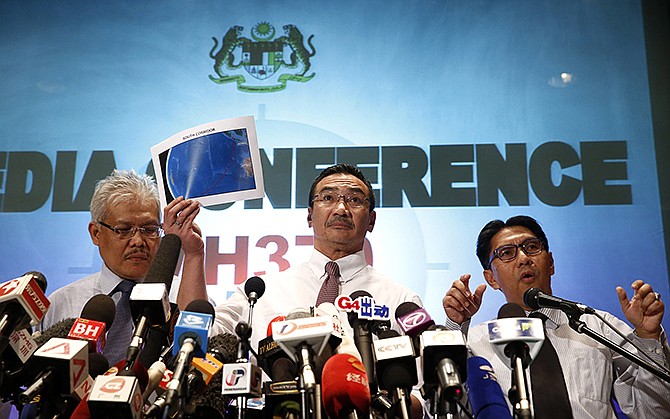KUALA LUMPUR, Malaysia (AP) - Officials revealed a new timeline Monday suggesting the final voice transmission from the cockpit of the missing Malaysian plane may have occurred before any of its communications systems were disabled, adding more uncertainty about who aboard might have been to blame.
The search for Flight 370, which vanished early March 8 while flying from Kuala Lumpur to Beijing with 239 people on board, has now been expanded deep into the northern and southern hemispheres. Australian vessels scoured the southern Indian Ocean and China offered 21 of its satellites to help Malaysia in the unprecedented hunt.
With no wreckage found in one of the most puzzling aviation mysteries of all time, relatives of those on the Boeing 777 have been left in an agonizing limbo.
Investigators say the plane was deliberately diverted during its overnight flight and flew off-course for hours. They haven't ruled out hijacking, sabotage, or pilot suicide, and they are checking the backgrounds of the 227 passengers and 12 crew members, as well as the ground crew, to see if links to terrorists, personal problems or psychological issues could be factors.
Malaysian Defense Minister Hishammuddin Hussein said finding the plane was still the main focus, and he did not rule out that it might be discovered intact.
"The fact that there was no distress signal, no ransom notes, no parties claiming responsibility, there is always hope," Hishammuddin said at a news conference.
Malaysian Airlines CEO Ahmad Jauhari Yahya said an initial investigation indicated that the last words heard from the plane by ground controllers - "All right, good night" - were spoken by the co-pilot, Fariq Abdul Hamid. Had it been a voice other than that of Fariq or the pilot, Zaharie Ahmad Shah, it would have clearest indication yet of something amiss in the cockpit before the flight went off-course.
Malaysian officials said earlier that those words came after one of the jetliner's data communications systems - the Aircraft Communications Addressing and Reporting System - had been switched off, suggesting the voice from the cockpit may have been trying to deceive ground controllers.
However, Ahmad said that while the last data transmission from ACARS - which gives plane performance and maintenance information - came before that, it was still unclear at what point the system was switched off, making any implications of the timing murkier.
The new information opened the possibility that both ACARS and the plane's transponders, which make the plane visible to civilian air traffic controllers, were turned off at about the same time. It also suggests that the message delivered from the cockpit could have preceded any of the severed communications.
Airline pilots cautioned against reading too much into what little is known so far about the actions of the Malaysia Airline crew.
"You can't take anything off table until everything is on table, and we don't even have an aircraft," said Boeing 737 pilot Mike Karn, president of the Coalition of Airline Pilots Associations.
Authorities have pointed to the shutdown of the transponders and the ACARS as evidence that someone with a detailed knowledge of the plane was involved. But Bob Coffman, an airline captain and former 777 pilot, said that kind of information is probably available on the Internet.
"We really don't know what happened in the airplane at this point," he said.
Although Malaysian authorities requested that all nations with citizens aboard the flight conduct background checks on them, it wasn't clear how thoroughly they were doing such checks at home. The father of a Malaysian aviation engineer aboard the plane said police had not approached anyone in the family about his 29-year-old son, Mohamad Khairul Amri Selamat, though he added that there was no reason to suspect him.
"It is impossible for him to be involved in something like this," said Selamat Omar, 60. "He is a good boy. ... We are keeping our hopes high. I am praying hard that the plane didn't crash and that he will be back soon."
French investigators arriving in Kuala Lumpur to lend expertise from the two-year search for an Air France jet that crashed in the Atlantic Ocean in 2009 said they were able to rely on distress signals. But that vital tool is missing in the Malaysia Airlines mystery because the flight's communications were deliberately silenced ahead of its disappearance, investigators say.
"It's very different from the Air France case. The Malaysian situation is much more difficult," said Jean Paul Troadec, a special adviser to France's aviation accident investigation bureau.

